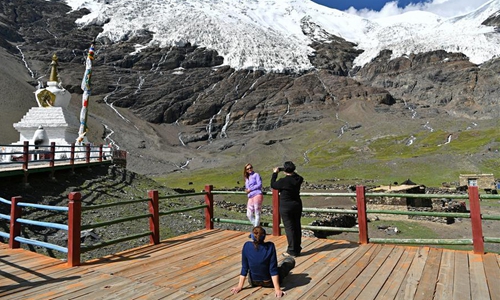HOME >> SOURCE
Tibet's GDP grew 9% in 2019, helping raise incomes and stabilize unemployment
By Xinhua—Global Times Source:Xinhua-Global Times Published: 2020/1/8 21:08:41

A tourist poses for photos at the Karuola Glacier scenic area in southwest China's Tibet Autonomous Region, Aug. 31, 2019. More than 40 million tourists from home and abroad visited southwest China's Tibet Autonomous Region in 2019, up 19 percent year on year, according to local authorities. In 2019, tourism revenue rose to 56 billion yuan (7.9 billion U.S. dollars), Qizhala, chairman of the regional government, said in his government work report delivered on Jan. 7, 2020 at the third session of the 11th People's Congress of Tibet Autonomous Region. (Xinhua/Li Xin)
The GDP of Southwest China's Tibet Autonomous Region grew about 9 percent in 2019.
Tibet's GDP was estimated at more than 160 billion yuan ($23 billion) last year, Qizhala, chairman of the regional government, said in his government work report delivered Tuesday at the third session of the 11th People's Congress of Tibet Autonomous Region.
The per capita disposable income for the region's rural residents grew about 13 percent, while that for urban residents rose more than 10 percent.
In 2019, Tibet created 52,000 urban jobs and maintained its urban registered unemployment rate within 3 percent.
The region also created more than 60,000 jobs for university graduates by improving employment policies and services, and 98.1 percent of Tibetan university graduates found jobs, according to the report.
The business environment in Tibet also improved last year. Qizhala said the region saw a daily increase of over 200 market entities on average, bringing the region's total number of market entities to over 325,000, with a total registered capital of 1.5 trillion yuan.
Qizhala said in the report that Tibet's GDP is expected to maintain a stable growth of 9 percent in 2020. The total retail sales of consumer goods aim to grow 10 percent this year.
The per capita disposable income in 2020 is estimated to grow 10 percent for the region's urban residents, and 13 percent for rural residents.
Qizhala added that the region aims to create 50,000 urban jobs and ensure the urban registered unemployment rate does not rise above 3.6 percent.
Posted in: INDUSTRIES,ECONOMY